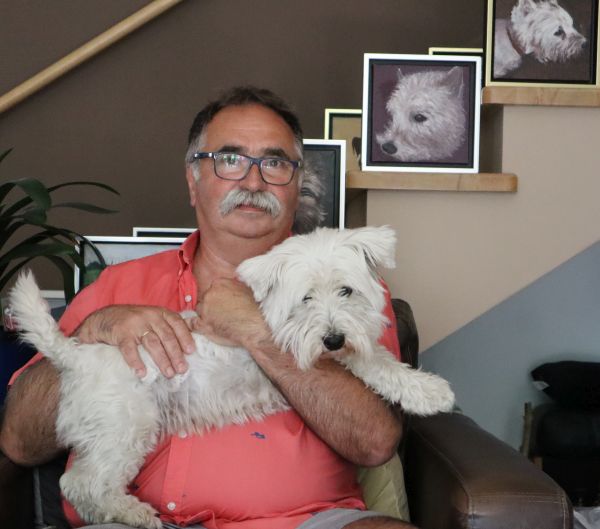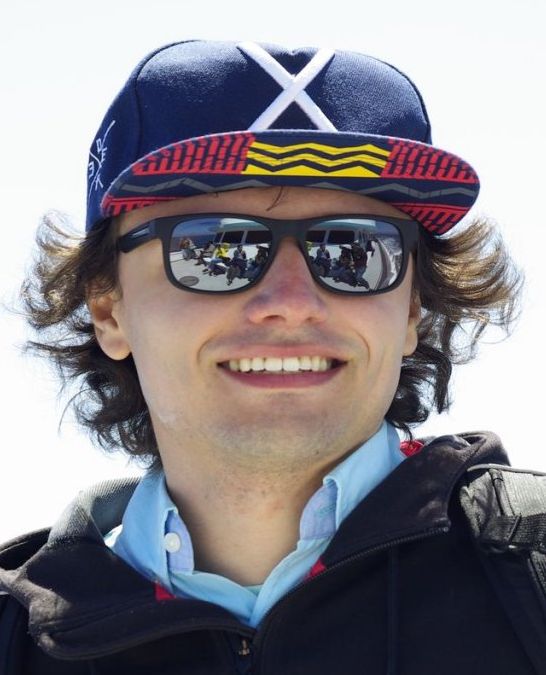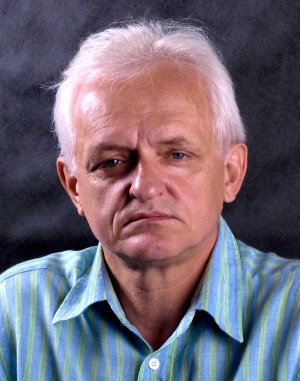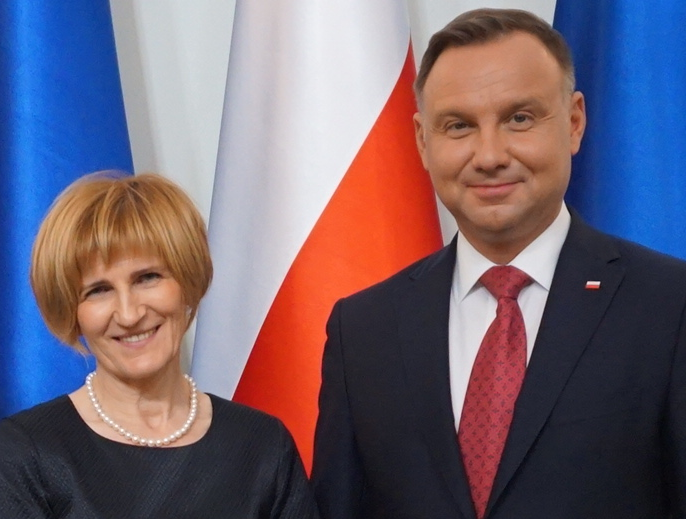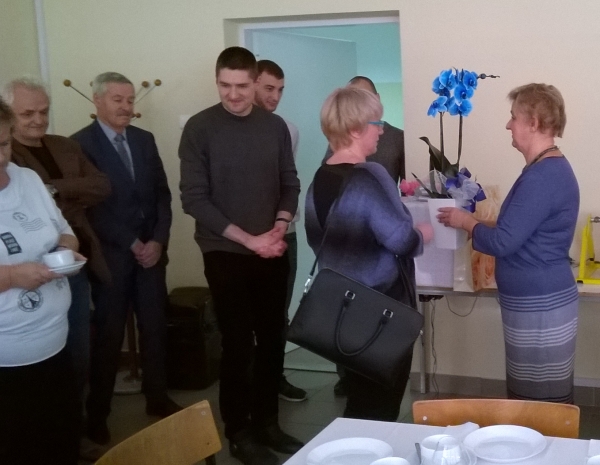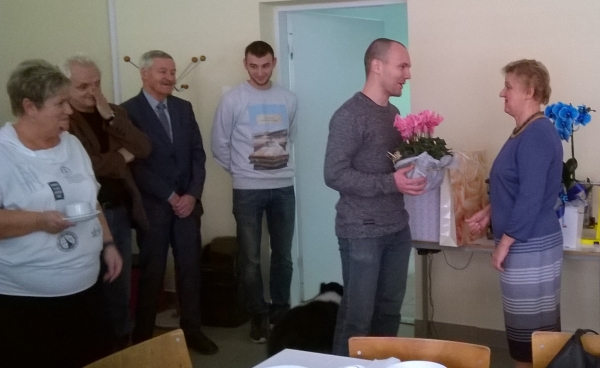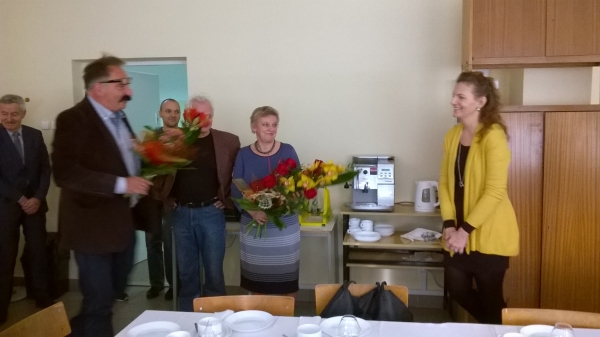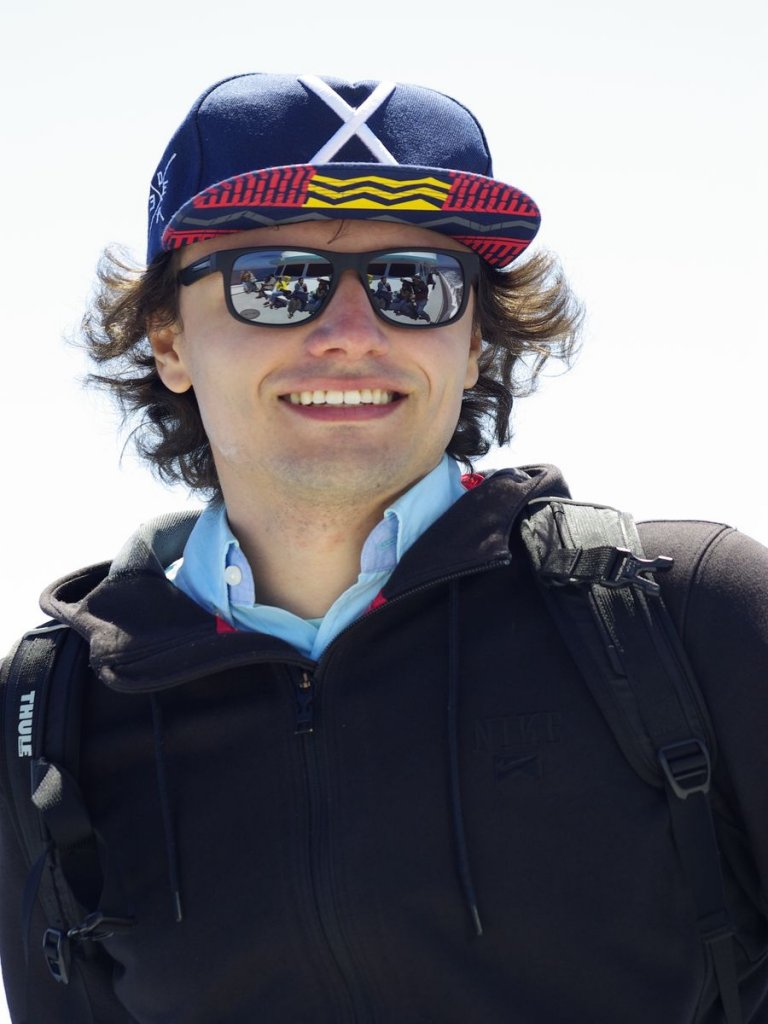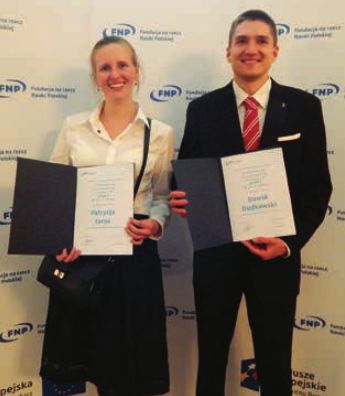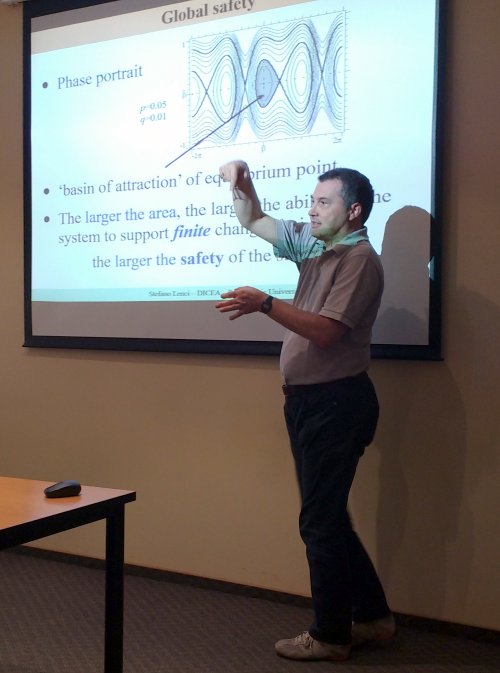2020/07/14: Pozanaukowe pasje naukowców PŁ: prof. Tomasz Kapitaniak
Kolejnym bohaterem nowego cyklu "Pozanaukowe pasje naukowców PŁ" jest profesor Tomasz Kapitaniak, autorytet w zakresie mechaniki nieliniowej. Wybitny specjalista w dziedzinie chaosu deterministycznego, opracował m.in. metody sterowania ruchami nieregularnymi. Członek rzeczywisty PAN.
Więcej na stronie Uczelni.
2020/07/10: Habilitacja dla dr Piotra Brzeskiego z Katedry Dynamiki Maszyn
Na posiedzeniu w dniu 10 lipca Rada ds Stopni w dyscyplinach Inżynieria Mechaniczna i Inżynieria Materiałowa podjęła decyzję o nadaniu stopnia doktora habilitowanego dr Piotrowi Brzeskiemu z naszej Katedry. To szczególne osiągnięcie - Piotr jest jednym z najmłodszych naukowców w PŁ jacy uzyskali ten stopień. Gratulacje!
2020/05/29: Postanowieniem z 10 marca Prezydent RP nadał tytuł profesora nauk inżynieryjno - technicznych Jerzemu Wojewodzie z Katedry Dynamiki Maszyn
Prof. Jerzy Wojewoda jest absolwentem Wydziału Mechanicznego PŁ (1980). W tym samym roku rozpoczął studia doktoranckie na Wydziale Mechanicznym. W 1984 r. został zatrudniony na stanowisku asystenta w Instytucie Mechaniki Stosowanej (później Katedra Dynamiki Maszyn).
W roku 1989 r. wyjechał, w ramach współpracy z PŁ, na Uniwersytet Strathclyde w Glasgow. Prawie dwuletni pobyt, uwieńczony został w 1992 roku pracą doktorską zatytułowaną: Experimental Study and Analysis of Quasiperiodically Forced System with Dry Friction (promotorzy: Ronald Barron i Tomasz Kapitaniak). Uzyskał tytuł Doctor of Philosophy w zakresie nauk technicznych nostryfikowany na Wydziale Mechanicznym Politechniki Łódzkiej.
W 2008 r. Jerzy Wojewoda wydał monografię Efekty histerezowe w tarciu suchym, która stanowiła podstawę do aplikacji o stopień doktora habilitowanego. W 2018 r. objął stanowisko profesora Politechniki Łódzkiej w Katedrze Dynamiki Maszyn.
Lista publikacji Web of Science obejmuje 47 artykułów w wiodących czasopismach naukowych, ponad 600 cytowań, aktualna wartość indeksu Hirscha wynosi 13. Łączny dorobek to: 5 książek, 6 rozdziałów w monografiach, 18 pozycji konferencyjnych.
Zainteresowania prof. Jerzego Wojewody obejmują muzykę klasyczną, fotografię cyfrową oraz żeglarstwo. W latach 2002-2007 odbył pięć rejsów po Bałtyku i Morzu Północnym. Jest również międzynarodowym sędzią sportowym w wyścigach motorowodnych PZMWiNW i członkiem komisji sportowej i technicznej oraz władz wykonawczych Międzynarodowej Unii Motorowodnej – UIM z siedzibą w Monaco.
2020/02/05: Dr Patrycja Jaros autorką artykułu w Nature Communications
Artykuł w "Nature Communications", którego współautorami są prof. Tomasz Kapitaniak i dr Patrycja Jaros z PŁ dostępny tutaj to najnowsze znaczące osiągnięcie naszych pracowników. Zapraszamy do zapoznania się z metodą miminalizowania zagrożenia blackoutem, czyli długotrwałą przerwą w dopływie energii na znacznym obszarze.
Tutaj posłuchasz wypowiedzi radiowej dr Patrycji Jaros dla rozgłośni Meloradio.
2020/01/27: Stypendia naukowe dla studentów!
Nabór wniosków o przyznanie stypendium odbędzie się w terminie od 27 stycznia 2020 r. do 21 lutego 2020 r.
Załączniki do pobrania:
Ogoszenie:
Regulamin:
Załącznik:
2020/01/14: Wyróżnienie dla pracy inżynierskiej Sandry Zarychty
Praca inżynierska, której autorką jest Sandra Zarychta, a promotorem dr Marek Balcerzak, zatytułowana „Konstrukcja i analiza napędu oscylacyjno-uderzeniowego”, zajęła pierwsze miejsce w Konkursie Najlepszych Prac Dyplomowych Absolwentów Wydziału Mechanicznego Politechniki Łódzkiej w roku akademickim 2018/2019, organizowanym przez Stowarzyszenie Inżynierów i Techników Mechaników Polskich oddział w Łodzi. Oprócz tego praca została zakwalifikowana do finałowego etapu XIX edycji Ogólnopolskiego Konkursu o Dyplom i Nagrodę prezesa SIMP, na najlepszą pracę dyplomową o profilu mechanicznym, organizowanego pod Honorowym Patronatem Ministra Nauki i Szkolnictwa Wyższego.
2019/11/08: Seminar by Arindam Mishra - India
Seminar by Arindam Mishra from India.
Title: Extreme events in a network of heterogeneous Josephson junctions.
Date: November 8, 2019 - 11.00. Place: Seminar Room near Dean's Office in A22 building.
Abstract: We observe rare and recurrent large spiking events in a heterogeneous network of superconducting Josephson junctions (JJ) connected through a resistive load and driven by a radio-frequency (rf) current in addition to a constant bias. The intermittent large spiking events show characteristic features of extreme events (EE) since they are larger than a statistically defined significant height. Under the influence of repulsive interactions and an impact of heterogeneity of damping parameters, the network splits into three sub-groups of junctions, one in incoherent rotational, another in coherent librational motion and a third sub-group originating EE. We are able to scan the whole population of junctions with their distinctive individual dynamical features either in EE mode or non-EE mode in parameter space. EE migrates spatially from one to another sub-group of junctions depending upon the repulsive strength and the damping parameter. For a weak repulsive coupling, all the junctions originate frequent large spiking events, in rotational motion when the average inter-spike-interval (ISI) is small, but it increases exponentially with repulsive interaction;it largely deviates from its exponential growth at a break point where EE triggers in a sub-group of junctions. The probability density of inter-event-intervals (IEI) in the subgroup exhibits a Poisson distribution. EE originates via instability of in-phase synchronization.
2019/11/04: Seminar by Nataliya Stankevich - Russian Federation
We are pleased to invite everyone to seminar by Nataliya Stankevich from Russian Federation.
Title: Occurrence of hyperchaos via sequence of secondary Neimark-Sacker bifurcations.
Date: November 4, 2019 - 11.00. Place: Seminar Room near Dean's Office in A22 building.
Abstract: On the example of various dynamical systems, including autonomous and non-autonomous flows, discrete maps, it is shown that the formation of hyperchaos is associated with the development of the Shilnikov chaotic attractor containing a saddle-focus with a two-dimensional unstable manifold. The appearance of a saddle-focus with a two-dimensional unstable manifold occurs as a result of a sequence of Neimark-Sacker bifurcations. The presence of secondary Neimark-Sacker bifurcations can lead to the emergence of a hierarchy of chaotic and hyperchaotic attractors.
2019/06/18: PhD seminar by mgr inż. Danylo Pikunov
W dniu 18 czerwca 2019 r. godz. 14.15 w sali 2M221 (drugie piętro budynku A22) odbędzie się seminarium podczas którego mgr inż. Danylo Pikunov przedstawi wyniki swojej pracy doktorskiej pt. "Numerical and experimental analysis of the mutual interaction between friction force and response of the frictional oscillator".
2019/05/27: Barbara Błażejczyk-Okolewska and Przemysław Perlikowski received the Professor title - May 2019strong>
We are pleased to announce that our collegues dr hab. inż. Barbara Błażejczyk-Okolewska and dr hab. inż. Przemysław Perlikowski received the title of professor of technical sciences by the President of the Republic of Poland Andrzej Duda on May 27, 2019. Congratulations!
Prezydent Rzeczypospolitej Polskiej Andrzej Duda wręczył 27 maja akty nominacyjne nauczycielom akademickim oraz pracownikom nauki i sztuki. Z Politechniki Łódzkiej nominacje otrzymało dwoje naukowców z Katedry Dynamiki Maszyn na Wydziale Mechanicznym - prof. Barbara Błażejczyk-Okolewska i prof. Przemysław Perlikowski.
More info here: Życie Uczelni
and in: Dziennik Łódzki.
2019/04/15: PhD seminar by mgr inż. Konrad Mnich
W dniu 15 kwietnia 2019 r. godz. 9.15 w sali 2M221 (drugie piętro budynku A22) odbędzie się seminarium podczas którego mgr inż. Koonrad Mnich przedstawi wyniki swojej pracy doktorskiej pt. "Budowa modeli inertera i nieliniowego tłumika drgań jako elementów dynamicznego tłumika drgań".
Promotorem pracy jest prof. dr hab. inż. Przemysław Perlikowski, a promotorem pomocniczym dr inż. Mateusz Lazarek.
Przemysław Perlikowski received the Professor title - February 2019
We are pleased to announce that our collegue dr hab. inż. Przemysław Perlikowski received the title of professor of technical sciences by the President of the Republic of Poland Andrzej Duda on February 12, 2019. Congratulations!
Program of the 4-th joint seminar on "Non-linear and adaptive dynamical systems" by IPPT PAN and Division of Dynamics of Lodz University of Technology
- 11:00 – 11:10 Przemysław Perlikowski (DoD): Welcome to Division of Dynamics
- 11:10 – 11:20 Łukasz Jankowski (IPPT PAN): Scientific topics in Department of Intelligent Technologies
- 11:20 – 11:50 Maciej Wasilewski (IPPT PAN): Adaptive Semi-Active Control of Structures Subjected to Travelling Load
- 11:50 – 12:20 Andrzej Mitura (Lublin University of Technology): Dynamics research of electromechanical systems with piezoelectric actuators
- 12:20 – 12:50 Kamil Opiela (IPPT PAN): Dual-scale modelling and 3D-printing of an adaptive sound absorber
- 12:50 – 13:20 Dawid Dudkowski (DoD): Traveling chimera states for coupled pendula
- 13:20 – 14:10 Coffee break
- 14:10 – 14:40 Danylo Pikunov (DoD): Bifurcational analysis of the friction-induced mechanical oscillator with modified LuGre friction model
- 14:40 – 15:10 Mariusz Ostrowski (IPPT): Energy transfer between vibrational modes by means of lockable joints
- 15:10 – 15:40 Robert Pietruszewski (Lodz University of Technology): Dynamika procesu ruszania pojazdów kołowych
2018/12/07: Obrona pracy doktorskiej Michała Niełacznego
DZIEKAN I RADA WYDZIAŁU MECHANICZNEGO zapraszają na PUBLICZNĄ DYSKUSJĘ NAD ROZPRAWĄ DOKTORSKĄ
mgr inż. Michał Niełaczny
pt. "3D Dynamic Modelling of the Unicycle-Unicyclist System".
Dyskusja odbędzie się w piątek, 7 grudnia 2018 roku, o godzinie 12.00 w sali Konferencyjnej Wydziału Mechanicznego Politechniki Łódzkiej, w budynku A22A.
Promotor: Profesor Tomasz Kapitaniak
Recenzenci: Profesor Marian Wiercigroch, Aberdeen, UK oraz Dr hab. Krzysztof Kęcik, Politechnika Lubelska.
2018/09/26: Obrona pracy doktorskiej Hugo Silva
DZIEKAN I RADA WYDZIAŁU MECHANICZNEGO zapraszają na PUBLICZNĄ DYSKUSJĘ NAD ROZPRAWĄ DOKTORSKĄ
Hugo Silva, MSc.
pt. "Optimization of the Mechanical Behaviour of Hollow-box Beams".
Dyskusja odbędzie się w czwartek, 27 września 2018 roku, o godzinie 11.00 w sali Rady Wydziału Mechanicznego Politechniki Łódzkiej, w budynku tzw. Fabryki Inżynierów XXI w. (sala 102, bud. A18).
Promotor: Dr hab. inż. Jerzy Wojewoda, prof. PŁ
Recenzenci: Dr hab. inż. Ewa Magnucka-Blandzi, prof. PP
Dr hab. inż. Jerzy Małachowski, prof. WAT
2018/09/26: Seminarium naukowe MSc. Abdul Rab Asary
W dniu 26 września o godzinie 12.00 w sali 2M221 Katedry Dynamiki Maszyn PŁ (budynek A22) odbędzie się seminarium podczas którego MSc Abdul Rab Asary z U.S Pakistan Center for Advanced studies in Energy (USPCAS-E), National University of Science & Technology, H-12 sector Islamabad z Pakistanu przedstawi założenia, i bieżące wyniki badań projektu pracy doktorskiej pt. "Solar Air Heater for Externally Heated Valve Engine".
2018/06/22: Obrona pracy doktorskiej Gokul PM
DZIEKAN I RADA WYDZIAŁU MECHANICZNEGO zapraszają na PUBLICZNĄ DYSKUSJĘ NAD ROZPRAWĄ DOKTORSKĄ
Gokul PM, MSc. pt. "Synchronization of systems with hidden attractors".
Dyskusja odbędzie się w piatek, 22 czerwca 2018 roku, o godzinie 12.00 w sali Rady Wydziału Mechanicznego Politechniki Łódzkiej, w budynku tzw. Fabryki Inżynierów XXI w. (sala 102, bud. A18).
Promotor: Profesor Tomasz Kapitaniak
Promotor pomocniczy: Dr Dawid Dudkowski
Recenzenci: Dr Awadesh Prasad, University of Delhi oraz Professor Grzegorz Litak, Lublin Unversity of Technology.
2018/05/23: Obrona pracy doktorskiej Marka Balcerzaka
DZIEKAN I RADA WYDZIAŁU MECHANICZNEGO zapraszają na PUBLICZNĄ DYSKUSJĘ NAD ROZPRAWĄ DOKTORSKĄ
mgr. inż. Marka Balcerzaka
pt. "Optimization of control system parameters with use of the new Lyapunov exponents estimation method".
Dyskusja odbędzie się w środę, 23 maja 2018 roku, o godzinie 17.00 w sali Rady Wydziału Mechanicznego Politechniki Łódzkiej, w budynku tzw. Fabryki Inżynierów XXI w. (sala 102, bud. A18).
Promotor: dr hab. inż. Artur Dąbrowski
Recenzenci: Prof. dr hab. inż. Andrzej Tylikowski oraz Prof. dr hab. inż. Jerzy Warmiński.
2018/05/18: Seminars of Arindam Mishra and Suman Saha
We have seminar of Arindam Mishra (Dragon-king-like extreme events in coupled bursting neurons) and Suman Saha (Role of Heterogeneity and Coupling in Synchronization of Dynamical Networks) on Fridat 18.05 at 10.30 in room 111 in blg. A18 (Fabryka Inżynierów).
Title: Dragon-king-like extreme events in coupled bursting neurons
Abstract : We present evidence of extreme events in two Hindmarsh-Rose bursting neurons mutually interacting via two different coupling configurations: chemical synaptic and repulsive diffusive coupling. A dragon-king-like probability distribution of the extreme events is seen for both the coupling where small to medium size events obey a power law and the extremely large events are outliers. The extreme events originate due to instability in antiphase synchronization of the coupled systems via two different routes, intermittency and quasiperiodicity for purely excitatory and inhibitory synaptic coupling respectively.
The origin of extreme events follows a common mechanism as due to an emergent instability in the antiphase synchronization manifold and is independent of the route to chaos of the coupled dynamics. However, they show disparate synchronization dynamics during two different routes of transition to complex dynamics. In the quasiperiodic regime, for pure inhibitory coupling, temporal dynamics of two oscillators are in a state of antiphase burst synchronization, but the pairs of arbitrary spikes within the bursts coincide to evolve into an intermittent in-phase spiking synchrony. For pure excitatory coupling in the intermittency regime, the neurons develop a state of antiphase spiking synchronization with occasional coincidence of two pairs of arbitrary spikes. A simple electronic experiment using two repulsively coupled analog circuits of the HR neuron model confirms occurrence of the dragon-king-like extreme events.
Title: Role of Heterogeneity and Coupling in Synchronization of Dynamical Networks
Abstract:
We intend to study synchronization in dynamical systems, limit cycle and chaotic systems. Establishing robustness to synchronization under perturbation in the form of parameter drifting and external noise is a major issue of concern in practical networks such as the electrical power grid, the brain network, the ecological network. We target to realize synchronization of dynamical systems that is to be robust under parameter perturbation, drifting of system parameter and coupling or interaction strength between the dynamical units.
We start with a simple model of two or three systems (limit cycle and chaotic) and search for an optimal coupling forms, in addition, to the conventional self-diffusive coupling links, to realize robustness of synchronization to parameter drifting. We plan to derive a common rule how to choose an optimal coupling profile for different dynamical models to establish robust and global synchronization. We approach both analytical and numerical studies. We investigate small to large networks, especially use network motifs, which is a building block of large networks for implementing and testing our method. Furthermore, we induce heterogeneity in the network and explore amplification of attractors.
2018/05/17: PhD seminar by Hugo Silva, M.Sc.
W dniu 17 maja o godzinie 14.00 w sali sali 2M221 Katedry Dynamiki Maszyn PŁ (budynek A22) odbędzie się seminarium podczas którego mgr inż. Hugo Silva z Uniwersytetu Minho, Braga, Portugalia przedstawi końcowe wyniki swojej pracy doktorskiej pt. "Optymalizacja zachowań mechanicznych belek o przekrojach skrzynkowych".
2018/04/19: Seminar by Professor Syamal Kumar Dana
Seminar of our Guest Prof. Syamal Kumar Dana in room 2M221 (second floor in A22 building) on Wednesday 23.05.2018 at 14.00 in room 2M221.
Prof. Syamal Kumar Dana will give a talk on: "Sudden transitions to large amplitude oscillation: Three routes to extreme events".
Abstract: We focus on sudden transition of small amplitude oscillation, periodic or chaotic, to large amplitude oscillation accompanying complexity in the dynamics. We identify three different processes en route to such sudden expansion of attractors in two example systems, (1) forced Liénard system, (2) two-coupled Hindmarsh-Rose (HR) neuron model.
In the forced Lineard system, we find a slow expansion of an attractor from a periodic state to chaos via period-doubling followed by a sharp transition from the bounded chaotic state to a large size chaotic attractor when a control parameter (forcing frequency) is varied. An interior crisis leads to such transition when a collision of a slowly expanding chaotic attractor occurs with a saddle orbit in presence of intrinsic bistability of the system. In the same system, an intermittency regime is also found in a different parameter (forcing frequency) regime where an interior crisis again leads to a sudden transition occurs from a periodic attractor of smaller size to a large size chaotic attractor with the varying forcing frequency. The temporal dynamics immediately after the transitions shows occasional, but recurrent high amplitude oscillations. The probability distributions of the occasional large events, in both the cases, shows log-tail non-Gaussian distribution indicating signatures of extreme events.
In the two coupled HR model, we establish antiphase synchronization via a combination of excitatory and inhibitory synaptic coupling. We find a third route to sudden large expansion of attractor: a bounded quasiperiodic state suddenly transits to large amplitude chaotic state with a small detuning of the inhibitory coupling strength from a critical value. Additionally, we find the intermittency route to sudden large expansion of attractor. The inhibitory coupling plays a crucial role in the occasional large departure of the trajectory of the coupled system from the antiphase synchronization manifold. This large excursion of the trajectory from the antiphase synchronization manifold is reflected as occasional large events in the temporal dynamics that follows the dragon-king-like distribution of extreme events. We evidence all the three routes in numerical as well as in electronic experiment.
- S. Leo Kingston, K. Thamilamaran, P. Pal, U. Feudel and S. K. Dana, Extreme events in the forced Liénard system, Phys. Rev. E 96, 052204 (2017).
- A. Mishra, S. Saha, M. Vigneshwaran, P. Pal, T. Kapitaniak, S. K. Dana, Dragon-king-like extreme events in coupled bursting neurons, (submitted).
"Fuma - the dog", paintings by Tomasz Kapitaniak
Exhibition opening guests could enjoy Fuma's portraits, nice atmosphere and a glass of wine. Paintings, mostly acryl on canvas were done by Tomasz between 2008 and 2017, all have a unique vision of his beloved dog and found nice reception from professional painters who honored with their presence.
Congratulations!
2018/01/25: Seminarium naukowe nt. projektu pracy doktorskiej - Hugo Silva, M.Sc.
W dniu 25 stycznia o godzinie 14.00 w Sali sali 2M221 Katedry Dynamiki Maszyn PŁ (budynek A22) odbędzie się seminarium podczas którego mgr inż. Hugo Silva z Uniwersytetu Minho, Braga, Portugalia przedstawi wyniki swojej pracy doktorskiej pt. "Optymalizacja zachowań mechanicznych belek o przekrojach skrzynkowych".
Abstract:
This work is focused on the study of efficient solutions for improvement of mechanical behavior and movement capability of industrial devices with mobile parts subjected to bending and torsion combined loading. After an extensive literature search, the all-metal sandwich geometries were selected due to their high efficiency by mass unit. Cellular structures were also analyzed, however, they did not show feasibility for their incorporation in optimization processes, mainly due to the difficulty of defining relevant design variables.
In the next stage, sandwich beams of various geometries were evaluated using an efficiency parameter. The orientation of the reinforcements, influence of transversal reinforcements, and geometry of the section were evaluated. Beams with a new configuration were designed and calculated using ANSYS MECHANICAL APDL. The feasibility of the novel beams was evaluated numerically by the comparison with conventional hollow-box beams. In bending, the displacements in the direction of the load application were studied, while in torsion the displacements and distortion angle were analyzed. A good improvement was obtained for all beams under bending loading, and for some in torsion.
Then, new beams were optimized using a MATLAB optimization code and a novel objective function defined according to the project goals: to decrease displacements, keeping the mass at a minimum. A sensitivity analysis was done to one of the beams in order to determine the influence of each variable in the mass and in the displacements. Custom methodology was developed to optimize weights with minimum displacements and incorporated in the objective function. A number of parameters was discussed, in order to evaluate both, efficiency of the code and geometry, respectively. Modal analysis was performed on each of statically optimized models, in order to determine their dynamic behavior.
Finally, design of a physical prototype was designed with help of CAD AUTODESK INVENTOR. A chosen beam was manufactured by steel sheet cut, and then TIG welding. A sample of sheet was tested to both rupture and elastic domain, to determine its main mechanical properties. The beam was tested mechanically with unsymmetrical loading, in order to validate the numerical results in loading equivalent to coupled bending and torsion.
Concluding, the work proves the developed solution present a realistic possibility for effective industrial application.
2018/06/22: Program of the 2nd joint seminar on "Non-linear and adaptive dynamical systems" by IPPT PAN and Division of Dynamics of Lodz University of Technology
- 10:00 – 10:10 Przemysław Perlikowski (DoD): Welcome to Division of Dynamics
- 10:10 – 10:35 Anita Orłowska (IPPT): Dynamic behaviour of the prestressed GFRP composite beams
- 10:35 – 11:00 Jarosław Latalski (Lublin University of Technology): Dynamics and control of an active composite blade rotor
- 11:00 – 11:25 Mateusz Lazarek (DoD): The comparison of two different CVTs used in TMD that enables changes of inertance
- 11:25 – 11:50 Bartłomiej Błachowski (IPPT): Modeling and numerical simulation of human gait dynamics
- 11:50 – 12:15 Piotr Wolszczak (Lublin University of Technology): Dynamics of an inverted pendulum with amplitude limiters
- 12:15 – 13:00 Coffee break
- 13:00 – 13:25 Dominik Pisarski (IPPT): Optimal stabilization of pipe discharging air with electromagnetic devices of motional type
- 13:25 – 13:50 Krzysztof Kęcik (Lublin University of Technology): A novel nonlinear pendulum vibration absorber with a pseudo-maglev harvester
- 13:50 – 14:15 Viet-Thanh Pham (DoD): Hidden attractor: theory and presence in engineering systems
- 14:15 – 14:40 Rami Faraj (IPPT): The concept of self-adaptive impact absorbing system
- 14:40 – 15:05 Marek Balcerzak (DoD): An alternative approach to the swing-up problem of an inverted pendulum
Irena Słowianek - 30th anniversary of her work to the Division
We had a pleasure to thank Irena for her years spent working with us at small party his afternoon.
Thank you very, very much!
At same time we welcome new member of staff - Mrs Teodora Kopacka who takes these diffucult duties from Irena.
2017/10/21: PhD seminar by mgr inż. Danylo Pikunov
W dniu 21 listopada 2017 r. godz. 14.15 w sali 2M221 Katedry Dynamiki Maszyn PŁ (budynek A22) odbędzie się seminarium podczas którego mgr inż. Danylo Pikunov przedstawi wyniki swojej pracy doktorskiej pt. "Numerical and experimental analysis of the mutual interaction between friction force and response of the frictional oscillator".
Abstract: In the presentation attention was focused on application of the modified method of Lyapunov exponents spectrum estimation for non-continuous systems to study mutual interactions between selected and possibly modified dynamical dry friction models and the nature of the response (periodic, quasi-periodic or irregular motion) of the frictional oscillator. A few number of possibly applicable dry friction models has been discussed. The performance of the method has been checked on the example of stick/slip oscillator with dry friction.
2017/10/05: Another PhD received in the Division
Mr Mateusz Lazarek has successfully defended his PhD thesis. It is entitled: "Mitigation of vibrations of structures using a tuned mass damper with inerter and nonlinear dash-pot", written and discussed in English. We got the next candidate for promising scientific career. Congratulations!
2017/10/02: Two successful defenses of PhD theses in the Division
Mrs Patrycja Jaros and Mr Dawid Dudkowski have successfully defended their PhD theses. Patrycja work was entitled: Revealing different kinds of chimera states in the systems of coupled pendula and the Dawid one: Chimera states in coupled multistable oscillators. Both theses written and defended in English in brillant way finished their Authors' first step into scientific career. Congratulations!
2017/09/27: PhD seminar by Mr Marek Balcerzak
W dniu 27 września 2017 r. godz. 12.15 w sali 2M221 Katedry Dynamiki Maszyn PŁ (budynek A22) odbyło się seminarium podczas którego mgr inż. Marek Balcerzak przedstawił wyniki swojej pracy doktorskiej pt. "Optimization of control system parameters with use of the new Lyapunov exponents estimation method".
Promotorem pracy jest dr hab. inż. Artur Dąbrowski.
Abstract: The main subject of the thesis is application of the novel method of Lyapunov exponents (LE) estimation in the field of control systems. It has been shown that the method can be adopted to tuning and optimization of control systems. The performance of the method has been checked on a real object – an inverted pendulum.
In the thesis, attention is focused on control systems. Adaptation of the new LLE estimation method to control systems is covered. Properties of the newly designed method in the field of regulation are shown. Approaches through velocity control and force control are considered. In order to design an efficient controller, parameters of the controlled object must be estimated with an acceptable accuracy. The model of the drive has been obtained from analysis of its step response, whereas friction model has been derived from free vibrations. After identification of the control object, it is possible to design a controller. In order to obtain high control quality, the LLE-like performance index has been minimalized. In order to find controller parameters, the Differential Evolution optimization method has been applied. The minimization process resulted in the set of controller constants that assured decent regulation quality and shorter stabilization time than in case of typical, linear methods.
The thesis confirms the fact that the new LLE estimation method can be applied in optimization of nonlinear control systems. The method proves to be more effective than linear control methods due to the fact, that the optimization is performed for the whole trajectory, not for a fixed point only.
This study has been supported by Polish Ministry of Science and Higher Education under the program “Diamond Grant”, project no. D/2013 019743.
2017/10/05: Announcement: PhD public defence by Mateusz Lazarek
DZIEKAN I RADA WYDZIAŁU MECHANICZNEGO zapraszają na PUBLICZNĄ DYSKUSJĘ NAD ROZPRAWĄ DOKTORSKĄ mgr Mateusza Lazarka pt. MITIGATION OF VIBRATIONS OF STRUCTURES USING A TUNED MASS DAMPER WITH INERTER AND NONLINEAR DASH-POT.
Dyskusja odbędzie się w czwartek, 5 października 2017 roku, o godzinie 12.00 w sali Rady Wydziału Mechanicznego Politechniki Łódzkiej, w budynku tzw. Fabryki Inżynierów XXI w. (sala 102, bud. A20).
Promotor: Dr hab. inż. Przemysław Perlikowski, Prof. PŁ
Recenzenci: Professor Marian Wiercigroch, University of Aberdeen
Dr hab. Łukasz Jankowski, Prof. IPPT PAN.
2017/10/02: Announcement: PhD public defence by Dawid Dudkowski
DZIEKAN I RADA WYDZIAŁU MECHANICZNEGO zapraszają na PUBLICZNĄ DYSKUSJĘ NAD ROZPRAWĄ DOKTORSKĄ mgr Dawida Dudkowskiego pt. CHIMERA STATES IN COUPLED MULTISTABLE OSCILLATORS.
Dyskusja odbędzie się w poniedziałek, 2 października 2017 roku, o godzinie 12.00 w sali Rady Wydziału Mechanicznego Politechniki Łódzkiej, w budynku tzw. Fabryki Inżynierów XXI w. (sala 102, bud. A20).
Promotor: Prof. dr hab. inż. Tomasz Kapitaniak
Recenzenci: Prof. Dr. Dr. h.c. mult. Jürgen Kurths, Humboldt-Universität zu Berlin and Potsdam Institute for Climate Impact Research
Prof. dr hab. Grzegorz Litak
2017/10/02: Announcement: PhD public defence by Patrycja Jaros
DZIEKAN I RADA WYDZIAŁU MECHANICZNEGO zapraszają na PUBLICZNĄ DYSKUSJĘ NAD ROZPRAWĄ DOKTORSKĄ mgr Patrycji Jaros pt. REVEALING DIFFERENT KINDS OF CHIMERA STATES IN THE SYSTEMS OF COUPLED PENDULA.
Dyskusja odbędzie się w poniedziałek, 2 października 2017 roku, o godzinie 10.00 w sali Rady Wydziału Mechanicznego Politechniki Łódzkiej, w budynku tzw. Fabryki Inżynierów XXI w. (sala 102, bud. A20).
Promotor: Prof. dr hab. inż. Tomasz Kapitaniak
Recenzenci: Prof. Dr. Dr. h.c. mult. Jürgen Kurths, Humboldt-Universität zu Berlin and Potsdam Institute for Climate Impact Research
Prof. dr hab. Grzegorz Litak
2017/0905: Dr P. Brzeski wyróżniony nagrodą Prezesa Rady Ministrów za najlepszą pracę doktorską
Wśród 25 laureatów nagród Prezesa Rady Ministrów za najlepsze rozprawy doktorskie w 2016 roku jest dr inż. Piotr Brzeski z Katedry Dynamiki Maszyn na Wydziale Mechanicznym Politechniki Łódzkiej. Doceniona przez komisję praca doktorska nosi tytuł "Transfer energii w układach sprzężonych oscylatorów". Jej promotorem jest dr hab. Przemysław Perlikowski, prof. PŁ.
Badania dotyczą optymalizacji dynamicznych tłumików drgań, które wykorzystuje się np. do tłumienia drgań wysokich budynków. Przedstawione w pracy wyniki badań dowodzą, że proste modyfikacje konstrukcji tłumików pozwalają istotnie poprawić ich skuteczność działania. Dla dra Piotra Brzeskiego to już kolejne, duże wyróżnienie. Przed rokiem młody naukowiec został stypendystą programu START Fundacji na rzecz Nauki Polskiej.
2017/06/29: PhD seminar by Mr Michał Niełaczny
W dniu 29 czerwca 2017 r. godz. 12 00 w sali 2M221 Katedry Dynamiki Maszyn PŁ (budynek A22) odbędzie się seminarium podczas którego mgr inż. Michał Niełaczny przedstawi wyniki swojej pracy doktorskiej pt. "3-D dynamics modelling of the unicycle–unicyclist system".
Promotorem pracy jest prof. dr hab. inż. Tomasz Kapitaniak.
2017/06/22: PhD seminar by Mr Mateusz Lazarek
W dniu 22 czerwca 2017 r. godz. 15 00 w audytorium 2M221 odbędzie się seminarium podczas którego mgr inż. Mateusz Lazarek przedstawi wyniki swojej pracy doktorskiej pt. "Mitigation of vibrations of structures using a tuned mass damper with inerter and nonlinear dash-pot".
Promotorem pracy jest dr hab. inż. Przemysław Perlikowski, prof. PŁ, a promotorem pomocniczym dr inż. Piotr Brzeski.
Abstract: Machines and structures working under external excitation are exposed to a resonance. To protect structures and machines methods of reducing of the oscillations' amplitude have been developed. The largest group of devices used in mitigation of vibrations are a tuned mass dampers (TMD). The most basic TMD is consisted of the mass and the spring and has the natural frequency equal to natural frequency of the damped structure while its mass is at least ten times smaller than the mass of the damped body. The TMD is extremely efficient in reducing the amplitude when the frequency of the excitation is matching with its natural frequency, but outside this range it causes the increase of the amplitude. In order to overcome that weaknesses a new type of the vibration's absorber with inerter is proposed. It is designed to damp out the oscillations of the maim mass assembly moving in the vertical direction excited kinematically by a crank mechanism. The vibration's absorber is mounted on the structure and is composed of combination of the classical TMD with a continuously variable transmission (CVT). The CVT enables continuously variation of a gear ratio which is used to stepless change of the inertance. The inertance adjustment let us achieve the accurate change of the TMD's natural frequency according to the current frequency of the excitation. Such possibility causes that the TMD is extremely efficient in the wide range of the frequency of excitation.
In our investigations we concern the mathematical and numerical modeling simultaneously with the laboratory tests. The frequency response curves (FRCs) are used to present how the considered device influences the dynamics of the analyzed system. We demonstrate its capabilities and broad spectrum of applications. Further studies concerns examination of the dissipation of energy in the guiding systems. We use two guiding system, i.e., a linear bearings for m ain mass and a rollers and TMD. We use the simplified model of energy dissipation (dry friction and viscous damping) is good enough to correctly model response of the system. We also show the description of the influence of a nonlinear damper with variable coefficient of damping placed between the main mass and the TMD.
2017/06/22: Seminar by Dr Simos Evangelou, June 22
We are pleased to invite you to attend the Seminar of our guest Dr Simos Evangelou from Imperial Collage London in a seminar room of Dean's Office of Faculty of Mechanical Engineering on Thursday 22.06.2017 at 10.15 (second floor in A22 building).
Dr Simos Evangelou will give a talk on: "Mechatronic suspensions for road vehicles".
Abstract:
Two novel mechatronic suspension systems for cars, which are based on active variable geometry and active link electromechanical technologies and advanced control, will be presented. The talk will cover the concept, design, mathematical modelling, control, simulation, application and experimental testing of each technology.
See also Dr Evangelou webpage -> here.
2017/05/30: Seminar by Dr Chittaranjan Hens
We are pleased to invite all to attend the Seminar of our guest Dr Chittaranjan Hens in a seminar room of Dean's Office of Faculty of Mechanical Engineering on Tuesday 30.05.2017 at 12.15 (Second floor in A22 building). Dr Chittaranjan Hens will give a talk on: "Spatio-temporal propagation of perturbation in complex networks". The abstract of his talk follows. Recent advances in network theory enable us to study the interplay between the topological structure and the intrinsic dynamic states of all nodes. Here we track the spatio-temporal patterns of propagation of information along the network, such as the spreading of diseases, the response to a genetic perturbation or the onset of collective synchronization. [1-3]. We analytically derive the response propagation, obtaining its dependence on the degree distribution, the distance from the perturbation and the intrinsic dynamics of each network. Our results uncover a deep universality in the propagation patterns crossing domains of inquiry, from disease spreading to technological failures and gene regulatory dynamics.
References:
- A. Arenas A., A. Díaz-Guilera , J. Kurths , Y. Moreno , C. Zhou, Physics Reports 469 (3), 93-153 (2008).
- B. Barzel, and A.L. Barabsi, Nature Physics 9, 673–681 (2013).
- B. Barzel, Y. Y. Liu and A.L. Barabsi , Nat.Comm. 6, 7186 (2014).
2017/05/29: Seminar by Mr Arindam Mishra
We are pleased to invite you to attend the Seminar of our guest Mr Arindam Mishra in a seminar room of Dean's Office of Faculty of Mechanical Engineering on Monday 29.05.2017 at 14.15 (Second floor in A22 building). Mr Arindam Misra will give a talk on: "Chimera states in a population of globally coupled oscillators". Abstract: I will discuss about how a network of globally coupled oscillators breaks into chimera states. We use a global coupling consisting of two components- attractive and repulsive mean field feedback and investigate how the interplay between attractive and repulsive coupling creates different dynamical states including chimera states. We explore the behavior of the coupled systems with different benchmark models like Lienard, Roosler and van-der Pol oscillators and also with the real life physical model like Josephson Junctions. We define some statistical measures to distinguish between different dynamical states.
2017/05/27: Patrycja Jaros i Dawid Dudkowski otrzymali stypendia START przyznane przez Fundację Nauki Polskiej
Patrycja Jaros (29) i Dawid Dudkowski (28) są w gronie 100 młodych badaczy objętych w tym roku programem stypendialnym. Laureatów konkursu wyłoniono spośród 1152 kandydatów. Uroczystość wręczenia dyplomów odbyła się 27 maja br. na Zamku Królewskim w Warszawie. Z wywiadu dla Zycia Uczelni: "Jesteśmy absolwentami matematyki stosowanej, którą ukończyliśmy na wydziale FTIMS PŁ. Na ostatnim roku studiów trafiliśmy do zespołu prof. Tomasza Kapitaniaka (laureata ówczesnego programu TEAM FNP), pod którego kierunkiem wykonaliśmy prace magisterskie. Studia matematyczne, które gorąco polecamy, pozwoliły nam poznać teorię i metody współczesnej matematyki wyższej, istotnie rozwinąć zdolności logicznego rozumowania, a co najważniejsze wykształcić w nas umiejętność odpowiedniego podejścia do rozwiązywania stawianych przez naukę (jak i życie) problemów. Obecnie, w swojej pracy zawodowej zajmujemy się dynamiką nieliniową (teorią układów dynamicznych). Przedmiotem prowadzonych badań są układy mechaniczne, lecz nie brakuje także modeli teoretycznych czy obejmujących inne dyscypliny nauki."
2017/05/22: Seminarium doktorskie mgr Patrycji Jaros
W poniedziałek 22 maja 2017, o godzinie 11:00 w sali audytoryjnej 1M03 budynku A22, odbędzie się seminarium naukowe zamykające przewód doktorski, podczas którego mgr Patrycja Jaros przedstawi główne wyniki swojej rozprawy doktorskiej zatytułowanej: "Revealing different kinds of chimera states in the systems of coupled pendula".
2017/05/09: Seminar by Professor Syamal Kumar Dana
Seminar of our Guest Prof. Syamal Kumar Dana in a seminar room of Dean's Office of Faculty of Mechanical Engineering on Tuesday 9.05.2017 at 12.15 (Second floor in A22 building).
Prof. Syamal Kumar Dana will give a talk on: "Dragon-king-like extreme events in bursting neurons".
Abstract: My talk describes a simple of model of two Hindmarsh-Rose bursting neuron systems under various coupling combinations, gap junction, mixed synaptic excitatory and inhibitory coupling that shows presence of dragon-king-like extreme events. Two coupled bursting neurons establish antiphase synchronization when the inhibitory coupling specially plays a role in occasional large departure of the trajectory of the coupled system from the antiphase synchronization manifold for a small detuning of the coupling strength. This large excursion of the trajectory from the antiphase synchronization manifold follows the dragon-king statistics with a large departure from a power law followed by the other trajectories which remained bounded to the antiphase synchronization manifold. We evidence this behavior in an experiment using analog electronic circuits of the Hindmarsh-Rose system.
2017/04/26: Seminar by Dawid Dudkowski, April 26
W dniu 26 kwietnia 2017 r. (środa), o godzinie 11:00 w sali audytoryjnej 2M221 przy laboratorium Katedry Dynamiki Maszyn Politechniki Łódzkiej (budynek A22), odbędzie się seminarium naukowe zamykające przewód doktorski, podczas którego mgr Dawid Dudkowski przedstawi główne wyniki swojej rozprawy doktorskiej zatytułowanej: Chimera states in coupled multistable oscillators. Wszystkich zainteresowanych serdecznie zapraszamy.
2016/09/09: Seminar by Professor Stefano Lenci from Ancona
Professor Stefano Lenci from Universita Politecnica delle Marche, Ancona, Italy gave excellent seminar entitled: Dynamical Integrity: a step after stability at Sept 9, 2016.
Abstract: The achievements occurred in nonlinear dynamics over the last thirty years entail a substantial change of perspective when dealing with vibration problems, since they are now deemed ready to meaningfully affect the analysis, control and design of mechanical and structural systems. This talk aims at overviewing the matter, by highlighting and discussing the important, yet still overlooked, role that some relevant concepts and tools may play in engineering applications. Upon dwelling on such topical concepts as local and global dynamics, bifurcation and complexity, theoretical and practical stability, attractor robustness, basin erosion, dynamical integrity, recent results obtained for a variety of systems and models of interest in applied mechanics and structural dynamics are overviewed in terms of analysis of nonlinear phenomena and their control. This is discussed for discrete systems and reduced order models of continuous systems, for applications ranging from macro- to micro/nano-mechanics.
2016-09-08: Two successful defenses of PhD theses in the Division
Mr Piotr Brzeski and Mr Krzysztof Jankowski have successfully defended their PhD theses today. Piotr work was entitled: Energy transfers in systems of coupled oscillators and the Krzysztof one: Modelling friction for the analysis of different dynamical systems. Both theses written and defended in English in brilliant way finished their Authors' first step into scientific career. Congratulations!
2016-05-24: Our PhD student Piotr Brzeski granted with START scholarschip
The Foundation emerged winners of the twenty-fourth edition of the scholarship program START. Among the grantees is a young researcher from the Department of Mechanical Engineering, MSc. Piotr Brzeski from the Division of Dynamics. This is his second awarded START scholarship. In addition to the scholarship he was also awarded a grant for a study trip to the group of Professor Lawrence N. Virgin at Duke University, USA. Mr Brzeski is the fourth year PhD student in mechanics. His supervisor is Dr. Przemysław Perlikowski, prof. TUL, also two-time winner of the START scholarship from the FNP. In the competition participated 1291 candidates selected 121 most talented young scientists who received FPS annual stypendium. The ceremony of awarding diplomas was held on May 21 at the Royal Castle in Warsaw. The relationship of this event can be seen on the channel of the Foundation for Polish Science on YouTube: https://www.youtube.com/watch?v=z3K3CrbNB0c
Seminar by Patrycja Jaros
We invite all to the seminar by Patrycja Jaros: Solitary states in Kuramoto model with inertia (20 mins) which will be held in 2M221 at Friday, January 29, 2016, 10:00.
Seminar by Prof. Marian Wiercigroch
We warmly invite everyone to the seminar by Prof. Marian Wiercigroch from University of Aberdeen: Grazing Induced Bifurcations: Innocent or Dangerous? which will be held in 2M221 at January 26, 2016, 12:15.
Professor Wiercigroch comes from Centre for Applied Dynamics Research, School of Engineering, University of Aberdeen, UK. His abstract follows:
In this lecture I will examine nature of subtle phenomenon such grazing bifurcations occurring in non-smooth systems. I will start with linear oscillators undergoing impacts with secondary elastic supports, which have been studied experimentally and analytically for near-grazing conditions [1]. We discovered a narrow band of chaos close to the grazing condition and this phenomenon was observed experimentally for a range of system parameters. Through stability analysis, we argue that this abrupt onset to chaos is caused by a dangerous bifurcation in which two unstable period-3 orbits, created at "invisible" grazing collide [2].
The experimentally observed bifurcations are explained theoretically using mapping solutions between locally smooth subspaces. Smooth as well as non-smooth bifurcations are observed, and the resulting bifurcations are often as an interplay between them. In order to understand the observed bifurcation scenarios, a global analysis has been undertaken to investigate the influence of stable and unstable orbits which are born in distant bifurcations but become important at the near-grazing conditions [3]. A good degree of correspondence between the experiment and theory fully justifies the adopted modelling approach.
Similar phenomena were observed for a rotor system with bearing clearances, which was analysed numerically [4] and experimentally [5]. To gain further insight into the system dynamics we have used a path following method to unveil complex bifurcation structures often featuring dangerous co-existing attractors.
References:
1. Ing, J., Pavlovskaia, E.E., Wiercigroch, M. and Banerjee, S. 2008 Philosophical Transactions of the Royal Society – Part A 366, 679-704. Experimental study of impact oscillator with one sided elastic constraint.
2. Banerjee, S., Ing, J., Pavlovskaia, E., Wiercigroch, M. and Reddy, R. 2009 Physical Review E 79, 037201. Invisible grazing and dangerous bifurcations in impacting systems.
3. Ing, J., Pavlovskaia, E., Wiercigroch, M. and Banerjee, S. 2010 International Journal of Bifurcation and Chaos 20(11), 3801-3817. Complex dynamics of bilinear oscillator close to grazing.
4. Páez Chávez, J. and Wiercigroch, M. 2013 Communications in Nonlinear Science and Numerical Simulation 18, 2571–2580. Bifurcation analysis of periodic orbits of a non-smooth Jeffcott rotor model.
5. Páez Chávez, J., Vaziri Hamaneh, V. and Wiercigroch, M. 2015 Journal of Sound and Vibration 334, 86-97. Modelling and experimental verification of an asymmetric Jeffcott rotor with radial clearance.
